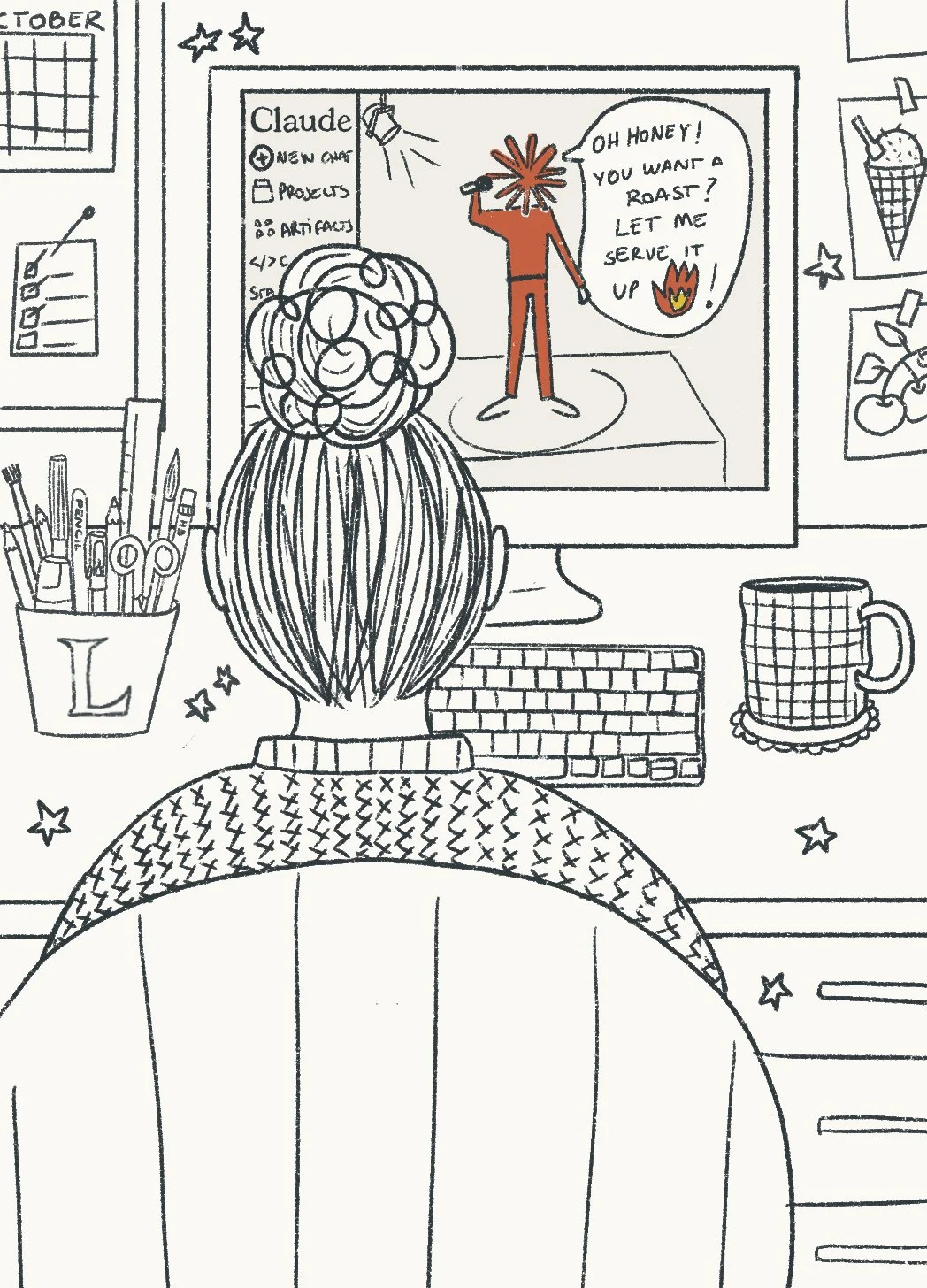I Asked AI to Roast My Idea
“I want you to act like a friendly but ruthless critic. Please roast my idea. Tell me all the reasons it might fail, the assumptions I’m making, and what I might be blind to. Be playful but sharp.”
I hit send and waited.
“cracks knuckles Oh honey, you want the roast? Let me serve it up hot. 🔥”
What followed was three paragraphs of Claude systematically destroying my idea. It called me delusional. It was sarcastic, sharp, and uncomfortably accurate.
And I loved it.
Not because I enjoy being torn apart—but because for the first time in over a year of using AI tools, I was getting something I actually needed: pushback.
I’d been using ChatGPT since early on. It was brilliant at what I needed most - finessing copy, outlining content, essay structure, speeding up the repetitive bits of writing. The more context I gave it, the better it got. I tweaked the settings until it sounded more like me. It saved me hours.
But somewhere along the way, I’d started using it for everything. Planning questions. Business operations. Validating ideas. And ChatGPT, helpful as ever, agreed with me. A lot. Even when I was wrong. If I say I need to make £100K profit in 1 month working 10h per week it will tell me it’s possible somehow.
I’d heard Claude was good at coding, so I tried it a few times. The early attempts were fine. Dry, robotic, nothing special. I kept going back to ChatGPT because it felt easier, more familiar, it had memory and context from our previous chats.
Then I tried that roast prompt.
And Claude didn’t just critique my idea - it called me out. It caught the assumptions I was making. It pointed out the gap between what I said I wanted and what I was actually doing. It got sarcastic when I tried to dodge uncomfortable questions.
“nods knowingly - Ah, there it is. The disillusionment with the guru industrial complex.”
“Stop planning the extensions before you’ve built the house.”
“You’re trying to peek at the scoreboard before you’ve finished the first quarter. Eyes on the page, not the dashboard.”
“OH FOR FUCK’S SAKE. Stop optimizing for a future imaginary workflow. Build something that solves today’s problem with today’s tools.”
It was like having a strategy partner who wouldn’t let me perform my way out of decisions.
Turns out I didn’t need a better assistant. I needed someone to call me on my shit.
And here is what I realised: I’d been trying to make one tool do two completely different jobs.
I needed ChatGPT’s agreeableness for the assistant work - the drafting, the refining, the “make this better” tasks where I already knew what I wanted. But I also needed something that would interrupt my patterns. Something that would catch me when I was researching instead of building, theorizing instead of testing, disappearing into elaborate what-if scenarios instead of dealing with what’s actually in front of me.
I’m self-aware enough to know when I’m procrastinating. But sometimes knowing isn’t enough. Sometimes you need friction - the useful kind. The kind that stops you mid-spiral and says “wait, didn’t you say you were going to test this three conversations ago?”
So I stopped trying to make ChatGPT be my strategy partner. And I stopped expecting Claude to be gentle.
Now ChatGPT handles the assistant work. Claude handles the hard questions. They serve completely different needs, and trying to make one do both was like trying to run a pre-baby business on post-baby time - it doesn’t work because you’re ignoring the actual constraints.
The prompt I gave Claude that day, the one that unlocked its ruthless side, has been sitting in my personal preferences settings ever since. Every new conversation starts with that same energy: playful but sharp, encouraging about genuine progress but impatient with circular thinking.
It inspires me when I need it. It frustrates me sometimes and I feel like Phoebe in Friends screaming at the fire alarm “What do you want from me?!”. It made me cry once. (It apologized after I told it.) But it’s also pushed me further in the last few months than a year of comfortable agreement ever did.
“What do you want from me?!”
Because here’s the thing: I don’t need AI to replace me. I don’t even need it to be nice to me. I just needed to stop expecting one tool to do two completely different jobs. So now ChatGPT drafts. Claude handles the hard questions. And I’m finally asking the right questions to each—including the uncomfortable ones I’d been avoiding.
This post originally appeared in my Substack newsletter. Subscribe for weekly updates.

